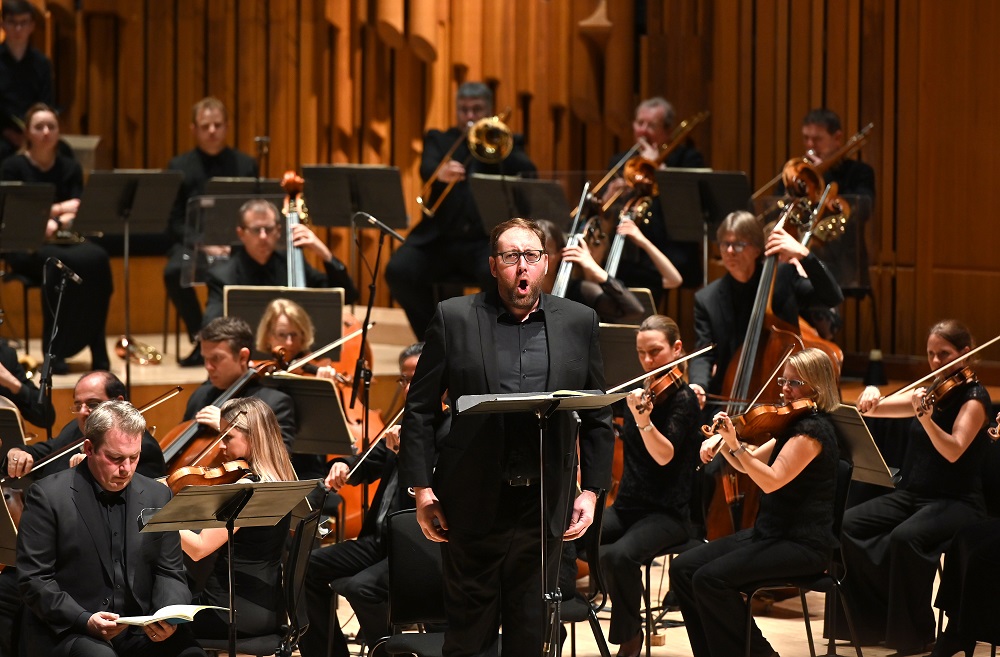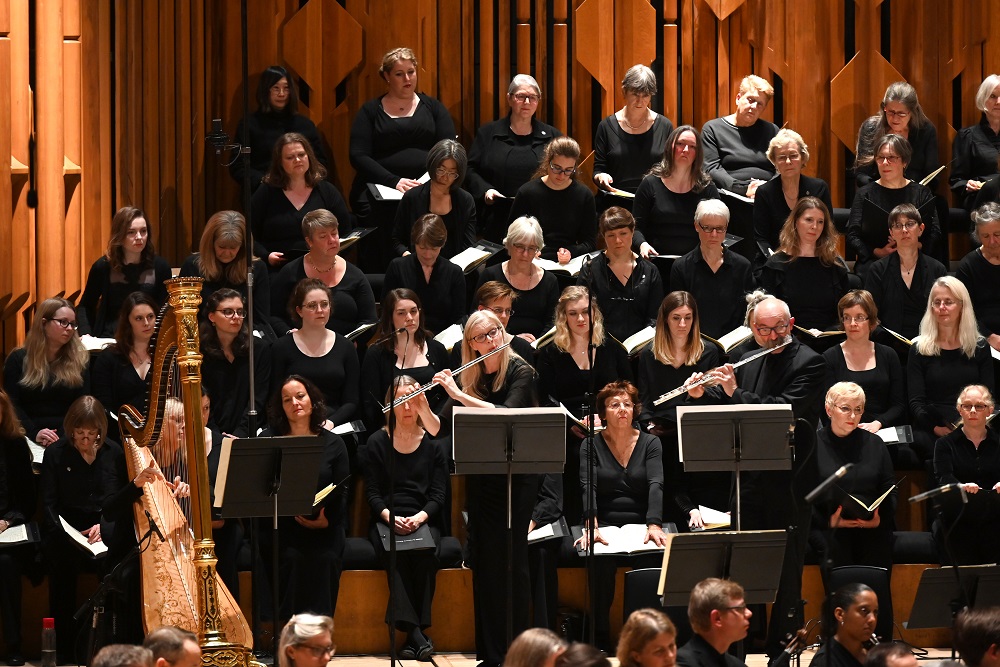L'enfance du Christ, BBCSO, Gardner, Barbican review - Berlioz's kindest wonder | reviews, news & interviews
L'enfance du Christ, BBCSO, Gardner, Barbican review - Berlioz's kindest wonder
L'enfance du Christ, BBCSO, Gardner, Barbican review - Berlioz's kindest wonder
Grace attained in a musical miracle of restraint and its dedicated performance
Like the fountains that sprang up in the desert during the Holy Family's flight into Egypt - according to a charming episode in the Gospel of Pseudo-Matthew - Berlioz's new-found creativity in the 1850s flowed from a couple of bars of organ music he inscribed in a friend's visitors book.

He had exceptionally dedicated musicians around him, too. The solo line up needs special qualities, embodied above all in the Marie of Karen Cargill, the great Berlioz singer of our time (that the idiomatic French style seems so innate in a Glaswegian is one of music's many intuitive mysteries). She sang the same role with the BBC Symphony Orchestra and Chorus this time five years ago - an equally fine performance conducted by François-Xaxier Roth - and the colours in the stupendous mezzo voice, with its contralto lower register, remain a wonder.
The tenderness with which Cargill stole into the woodwind textures of the 6/8 lullaby to the infant Jesus, both instruments and voice stressing Berlioz's idiosyncratic sharpened note which adds pain to potential placidity, was emblematic of the serene stretches in this mostly lightly-scored work. BBCSO principal oboe Richard Simpson mirrored her concerns to restrained perfection, while Gardner kept the underlying pulse going even in the most ethereal, air-treading passages. Though less vivid, Cargill's Joseph, Étienne Dupuis, rose to the anguish of the outcast father seeking refuge in exile. 
The lightness of this scene, inevitably the one that has most resonance with us today, is almost unbearably beautiful, with the little choral fugue and its counterpart in the orchestral bustle to welcome the exhausted family followed by the dance-music for two flutes and harp (Michael Cox, Kathleen Stevenson and Louise Martin, consummate in providing bewitching entertainment for everyone else in the hall, pictured below). 
rating
Share this article
The future of Arts Journalism
You can stop theartsdesk.com closing!
We urgently need financing to survive. Our fundraising drive has thus far raised £49,000 but we need to reach £100,000 or we will be forced to close. Please contribute here: https://gofund.me/c3f6033d
And if you can forward this information to anyone who might assist, we’d be grateful.

Subscribe to theartsdesk.com
Thank you for continuing to read our work on theartsdesk.com. For unlimited access to every article in its entirety, including our archive of more than 15,000 pieces, we're asking for £5 per month or £40 per year. We feel it's a very good deal, and hope you do too.
To take a subscription now simply click here.
And if you're looking for that extra gift for a friend or family member, why not treat them to a theartsdesk.com gift subscription?
more Classical music
 Weilerstein, NYO2, Payare / Dueñas, Malofeev, Edinburgh International Festival 2025 review - youthful energy and emotional intensity
Big-boned Prokofiev and Shostakovich, cacophonous López, plus intense violin/piano duo
Weilerstein, NYO2, Payare / Dueñas, Malofeev, Edinburgh International Festival 2025 review - youthful energy and emotional intensity
Big-boned Prokofiev and Shostakovich, cacophonous López, plus intense violin/piano duo
 theartsdesk at the Three Choirs Festival - Passion in the Cathedral
Cantatas new and old, slate quarries to Calvary
theartsdesk at the Three Choirs Festival - Passion in the Cathedral
Cantatas new and old, slate quarries to Calvary
 BBC Proms: Estonian Philharmonic Chamber Choir, Kaljuste review - Arvo Pärt 90th birthday tribute
Stillness and contemplation characterise this well sung late-nighter
BBC Proms: Estonian Philharmonic Chamber Choir, Kaljuste review - Arvo Pärt 90th birthday tribute
Stillness and contemplation characterise this well sung late-nighter
 BBC Proms: Kholodenko, BBCNOW, Otaka review - exhilarating Lutosławski, underwhelming Rachmaninov
Polish composers to the fore in veteran conductor’s farewell
BBC Proms: Kholodenko, BBCNOW, Otaka review - exhilarating Lutosławski, underwhelming Rachmaninov
Polish composers to the fore in veteran conductor’s farewell
 theartsdesk at the Pärnu Music Festival 2025 - Arvo Pärt at 90 flanked by lightness and warmth
Paavo Järvi’s Estonian Festival Orchestra still casts its familiar spell
theartsdesk at the Pärnu Music Festival 2025 - Arvo Pärt at 90 flanked by lightness and warmth
Paavo Järvi’s Estonian Festival Orchestra still casts its familiar spell
 BBC Proms: Batsashvili, BBC Scottish Symphony Orchestra, Ryan Wigglesworth review - grief and glory
Subdued Mozart yields to blazing Bruckner
BBC Proms: Batsashvili, BBC Scottish Symphony Orchestra, Ryan Wigglesworth review - grief and glory
Subdued Mozart yields to blazing Bruckner
 Classical CDs: Hens, Hamburg and handmaids
An unsung French conductor boxed up, plus Argentinian string quartets and baroque keyboard music
Classical CDs: Hens, Hamburg and handmaids
An unsung French conductor boxed up, plus Argentinian string quartets and baroque keyboard music
 BBC Proms: McCarthy, Bournemouth SO, Wigglesworth review - spring-heeled variety
A Ravel concerto and a Walton symphony with depth but huge entertainment value
BBC Proms: McCarthy, Bournemouth SO, Wigglesworth review - spring-heeled variety
A Ravel concerto and a Walton symphony with depth but huge entertainment value
 BBC Proms: First Night, Batiashvili, BBCSO, Oramo review - glorious Vaughan Williams
Spirited festival opener is crowned with little-heard choral epic
BBC Proms: First Night, Batiashvili, BBCSO, Oramo review - glorious Vaughan Williams
Spirited festival opener is crowned with little-heard choral epic
 Interview: Quinteto Astor Piazzolla on playing in London and why Mick Jagger's a fan
Music Director Julián Vat and pianist Matias Feigin compare notes on Piazzolla
Interview: Quinteto Astor Piazzolla on playing in London and why Mick Jagger's a fan
Music Director Julián Vat and pianist Matias Feigin compare notes on Piazzolla
 Classical CDs: Bells, birdsong and braggadocio
British contemporary music, percussive piano concertos and a talented baritone sings Mozart
Classical CDs: Bells, birdsong and braggadocio
British contemporary music, percussive piano concertos and a talented baritone sings Mozart

Add comment